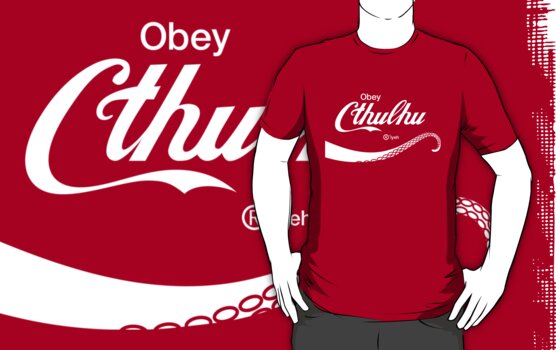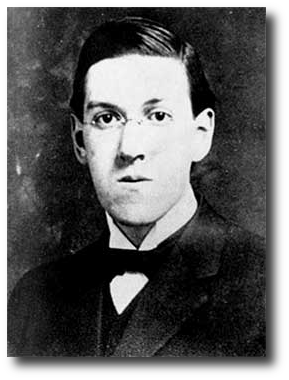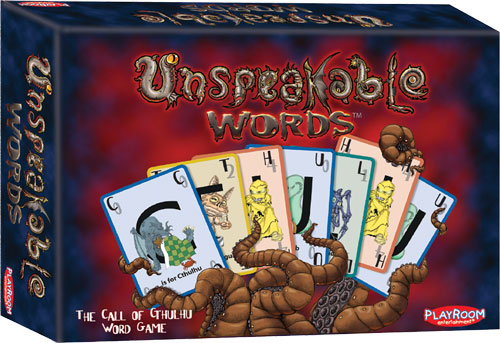Hands down, my favourite t shirt I've ever worn is this one
here.
 This shirt comes courtesy of TeeFury, a website that sells t-shirts
that are obviously geek related. The trick with TeeFury is that an artist makes a design, and Tee Fury sells it for
24 hours. Then the design is gone, so you have to check the site often, otherwise you might miss out on that perfect shirt. Once in a while, TeeFury will revisit some previous designs and run
reprints. Shirts like this mash-up of Lovecraft's most famous creation and the world's most popular pop (soda to you Americans) represent a
secret handshake, a signal to fellow enthusiasts of his work. I've had people look at the shirt, disgusted
that I would shill a popular soft-drink, and miss the point entirely.
This shirt comes courtesy of TeeFury, a website that sells t-shirts
that are obviously geek related. The trick with TeeFury is that an artist makes a design, and Tee Fury sells it for
24 hours. Then the design is gone, so you have to check the site often, otherwise you might miss out on that perfect shirt. Once in a while, TeeFury will revisit some previous designs and run
reprints. Shirts like this mash-up of Lovecraft's most famous creation and the world's most popular pop (soda to you Americans) represent a
secret handshake, a signal to fellow enthusiasts of his work. I've had people look at the shirt, disgusted
that I would shill a popular soft-drink, and miss the point entirely.
On the other hand, not too long ago I walked into a mall with the shirt and a woman threw up the devil horns and proclaimed, “Cthulhu!! Right on man, right on!!!” I found her enthusiasm and approval both satisfying and startling. I remember I actually peed a little.
My wife is easily the most literate person I've ever met. Not only a retired English teacher, she’s a voracious consumer of books (mysteries and thrillers especially), and a published author. She’s in love with the written word, and as a scholar, she’s fascinated by trends in literature.
My wife is easily the most literate person I've ever met. Not only a retired English teacher, she’s a voracious consumer of books (mysteries and thrillers especially), and a published author. She’s in love with the written word, and as a scholar, she’s fascinated by trends in literature.
So it comes as no surprise that she would be the one to ask
the question (I’m paraphrasing here):
“Okay, what’s up with H.P. Lovecraft?”
“What do you mean?” I replied.
“How do people know him? His prose is dense, thoughtful, and packed with imagery, but is so verbose modern readers might shy away from his work. It's a throwback to a writing style that requires such dedication from a reader, and yet his body of work isn't overwhelmingly extensive. People know about his creations, but I imagine many of those same people haven't read his work. How is he this pop-culture icon? ”
It’s a fair question.
H.P. Lovecraft (1890-1937) is credited with being a pioneer of weird
fiction, cosmic horror stories, and had a profound influence on Stephen King,
who claimed that no one author had a greater influence on his work. That said, Lovecraft was not the most well-known
author in his own right. His work was
primarily featured only in Pulp Magazines of his era, and like many authors and
artists, did not gain real notoriety until after his death. Lovecraft’s work was liberally modified with great artistic licence, serving as partial inspirations for a few films, but the versions were often so
twisted from the original work (and were just not good films to begin with),
that no one bothered to learn of their original source. Stephen King mentioned his name in a few
interviews, along with Poe and Algernon Blackwood as forerunners to King, but
these small mentions here and there aren't enough to launch Lovecraft into the
spotlight he’s been given courtesy of the geek community. Something had to take Lovecraft from
relative obscurity into the world of South Park , music, and comic books.
In my opinion... it's all thanks to games.
After his death, Arkham House publishing began to collect and re-release Lovecraft's work to a growing audience, many of whom are partial to the escapism of table top RPGs. One of Dungeons and Dragons' original supplements, Deities and Demigods, used to include material on the Cthulhu Mythos prior to Chaosium locking down the rights for their own game. As the popularity of the material increased, other companies began developing table top board game versions of the RPG (with video games following suit). It's my belief, and I'm sure I'm not alone in this, that the increase in popularity of RPGs and table top games are what kept Lovecraft alive in the realm of Geek-culture, and right now Geek-culture is Pop Culture. It's a good time to be a nerd.
Lovecraft's work has had a notable influence on our game club. Games inspired by his mythos permeate the world of table top gaming, so here are four notable games from our collection that bring Lovecraft's work to life. If reading his anthologies aren't giving you enough of a taste of cosmic horror mixed with ancient rituals designed to drive an archaeologist insane, check out these fine games:
Unspeakable Words: This game received a great deal of attention courtesy of Table Top, and is now part of a Kickstarter campaign to fund a new printing. Unspeakable Words is a word game where players use cards to create words, and then roll a die in order to challenge the value of the word. If you lose the roll, you lose one sanity, and if you run out of sanity, you're out of the game. There are some brilliant variant rules, one of which occurs when you have only one sanity left. If that's the case, the rules of spelling no longer apply to you. "Hlnkqww" is a word, or at least it is to those who are nearly insane. It's a "hail mary" play as you teeter on the edge of spelling madness. The sanity markers are also adorable.
King of Tokyo: King of Tokyo is a wonderful game that combines the dice rolling of Yhatzee with the mayhem of a giant monster battle royal. As fun as KoT is, the individual characters you could pick were essentially identical. Each monster had a unique look and name, but they were merely cardboard pawns without distinct gameplay...that is until the Power Up! expansion arrived.
Besides introducing the ever-so-awesome character Panda Kai, the Power Up! expansion included Evolution cards, distinct powers for each specific monster, adding a much needed level of character depth to the game. Iello games decided that the character known as the Kraken, a seemingly generic sea creature, was in fact another version of Lovecraft's most famous Elder God.
The Kraken's evolution cards Cult Following, Sunken Temple, and Eater of Souls are clearly an homage to Lovecraft, and catapulted the Kraken to become my second favourite character (Panda Kai is still #1 in this geek's heart).
Smash Up: The Obligatory Cthulhu Set: Another expansion to an already fun game, The Obligatory Cthulhu Set adds four factions to the huge pantheon of characters already available. Fans of Lovecraft's work will recognize references to characters and places such as Miskatonic University, the town of Innsmouth, and the Dunwich Horror. The game also introduced a sanity mechanic called Madness cards. Playing certain cards force Madness cards into your deck, and count against you at the end of the game. In fact, a player who thinks they have won the game on points may end up losing because of an onslaught of Madness. You can't get more Lovecraftian (an actual word) than that!
Elder Sign: Fantasy Flight games has a couple of wildly popular Cthulhu based games, notably Arkham Horror and Eldritch Horror. Both of these are fine games, but a little long for an after school gaming group (each game is between two to four hours long). The shorter version of these epic games is Elder Sign, a great little cooperative game where each player takes on the role of a unique investigator with their own special abilities. The investigators team up to explore a museum which is currently being invaded by the minions of an Elder God who are attempting to release an ancient evil upon the world. The investigators fight monsters, search for relics, and open dimensional doorways by rolling special dice. Like the other games mentioned, maintaining one's sanity is as important as keeping all of your organs in tact. It's a fun game that still maintains the atmosphere of its larger cousins, but only taking an hour to play. It also has an IOS version that plays nicely on the iPad (but not nearly as fun as playing with a group of people).
Thank you all reading another verbose discussion. Come back in a few days to read about Week 9 of this year's Table Top Game Club! We already had a rocking game of Small World, and we'll see where Open Gaming Friday takes us.
Thanks for reading.
In my opinion... it's all thanks to games.
After his death, Arkham House publishing began to collect and re-release Lovecraft's work to a growing audience, many of whom are partial to the escapism of table top RPGs. One of Dungeons and Dragons' original supplements, Deities and Demigods, used to include material on the Cthulhu Mythos prior to Chaosium locking down the rights for their own game. As the popularity of the material increased, other companies began developing table top board game versions of the RPG (with video games following suit). It's my belief, and I'm sure I'm not alone in this, that the increase in popularity of RPGs and table top games are what kept Lovecraft alive in the realm of Geek-culture, and right now Geek-culture is Pop Culture. It's a good time to be a nerd.
Lovecraft's work has had a notable influence on our game club. Games inspired by his mythos permeate the world of table top gaming, so here are four notable games from our collection that bring Lovecraft's work to life. If reading his anthologies aren't giving you enough of a taste of cosmic horror mixed with ancient rituals designed to drive an archaeologist insane, check out these fine games:
Unspeakable Words: This game received a great deal of attention courtesy of Table Top, and is now part of a Kickstarter campaign to fund a new printing. Unspeakable Words is a word game where players use cards to create words, and then roll a die in order to challenge the value of the word. If you lose the roll, you lose one sanity, and if you run out of sanity, you're out of the game. There are some brilliant variant rules, one of which occurs when you have only one sanity left. If that's the case, the rules of spelling no longer apply to you. "Hlnkqww" is a word, or at least it is to those who are nearly insane. It's a "hail mary" play as you teeter on the edge of spelling madness. The sanity markers are also adorable.
King of Tokyo: King of Tokyo is a wonderful game that combines the dice rolling of Yhatzee with the mayhem of a giant monster battle royal. As fun as KoT is, the individual characters you could pick were essentially identical. Each monster had a unique look and name, but they were merely cardboard pawns without distinct gameplay...that is until the Power Up! expansion arrived.
Besides introducing the ever-so-awesome character Panda Kai, the Power Up! expansion included Evolution cards, distinct powers for each specific monster, adding a much needed level of character depth to the game. Iello games decided that the character known as the Kraken, a seemingly generic sea creature, was in fact another version of Lovecraft's most famous Elder God.
The Kraken's evolution cards Cult Following, Sunken Temple, and Eater of Souls are clearly an homage to Lovecraft, and catapulted the Kraken to become my second favourite character (Panda Kai is still #1 in this geek's heart).
Smash Up: The Obligatory Cthulhu Set: Another expansion to an already fun game, The Obligatory Cthulhu Set adds four factions to the huge pantheon of characters already available. Fans of Lovecraft's work will recognize references to characters and places such as Miskatonic University, the town of Innsmouth, and the Dunwich Horror. The game also introduced a sanity mechanic called Madness cards. Playing certain cards force Madness cards into your deck, and count against you at the end of the game. In fact, a player who thinks they have won the game on points may end up losing because of an onslaught of Madness. You can't get more Lovecraftian (an actual word) than that!
Elder Sign: Fantasy Flight games has a couple of wildly popular Cthulhu based games, notably Arkham Horror and Eldritch Horror. Both of these are fine games, but a little long for an after school gaming group (each game is between two to four hours long). The shorter version of these epic games is Elder Sign, a great little cooperative game where each player takes on the role of a unique investigator with their own special abilities. The investigators team up to explore a museum which is currently being invaded by the minions of an Elder God who are attempting to release an ancient evil upon the world. The investigators fight monsters, search for relics, and open dimensional doorways by rolling special dice. Like the other games mentioned, maintaining one's sanity is as important as keeping all of your organs in tact. It's a fun game that still maintains the atmosphere of its larger cousins, but only taking an hour to play. It also has an IOS version that plays nicely on the iPad (but not nearly as fun as playing with a group of people).
Thank you all reading another verbose discussion. Come back in a few days to read about Week 9 of this year's Table Top Game Club! We already had a rocking game of Small World, and we'll see where Open Gaming Friday takes us.
Thanks for reading.









No comments:
Post a Comment